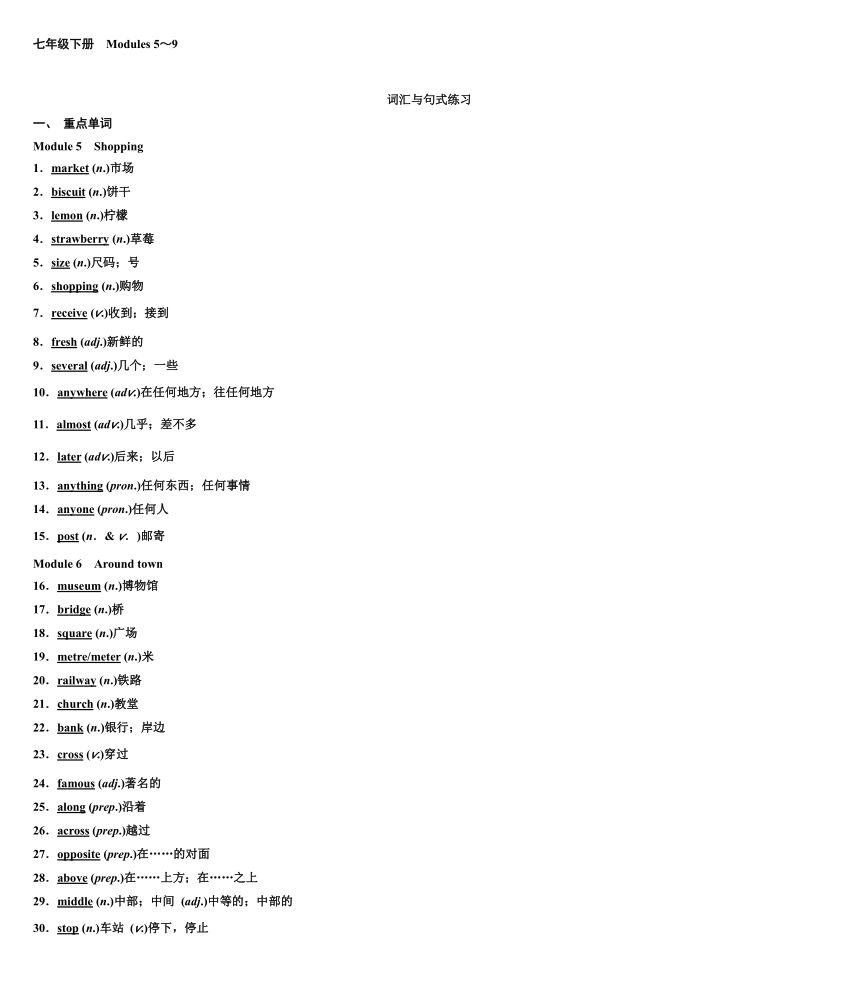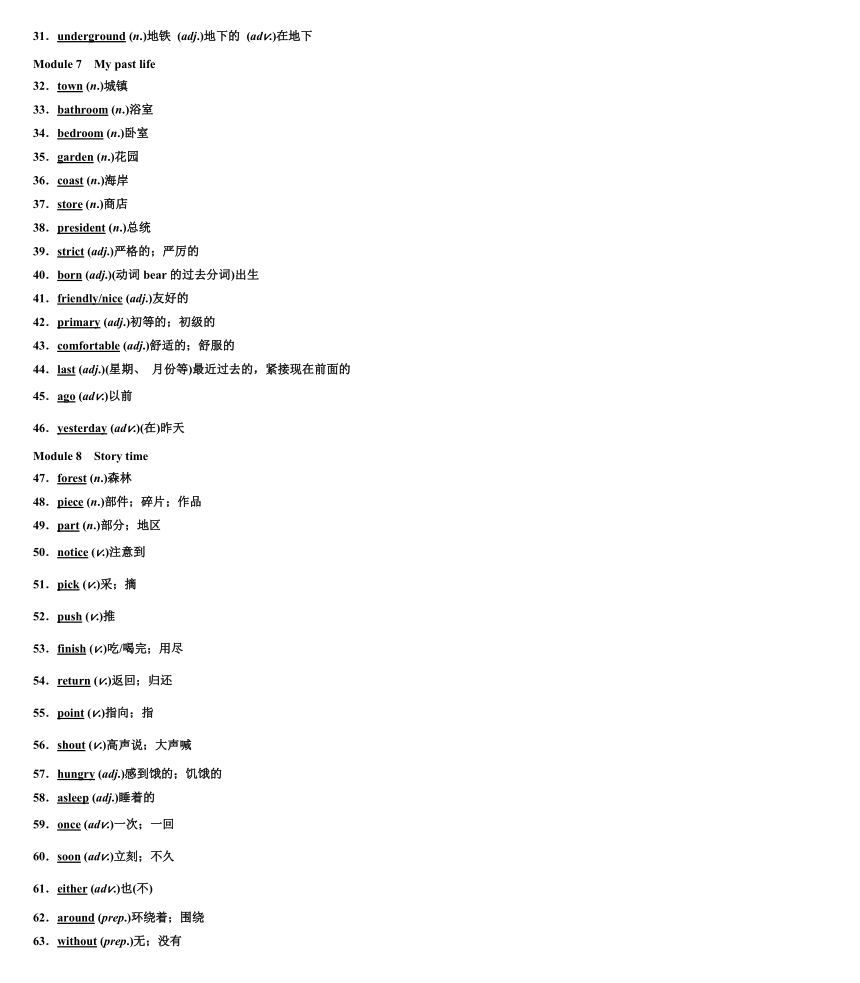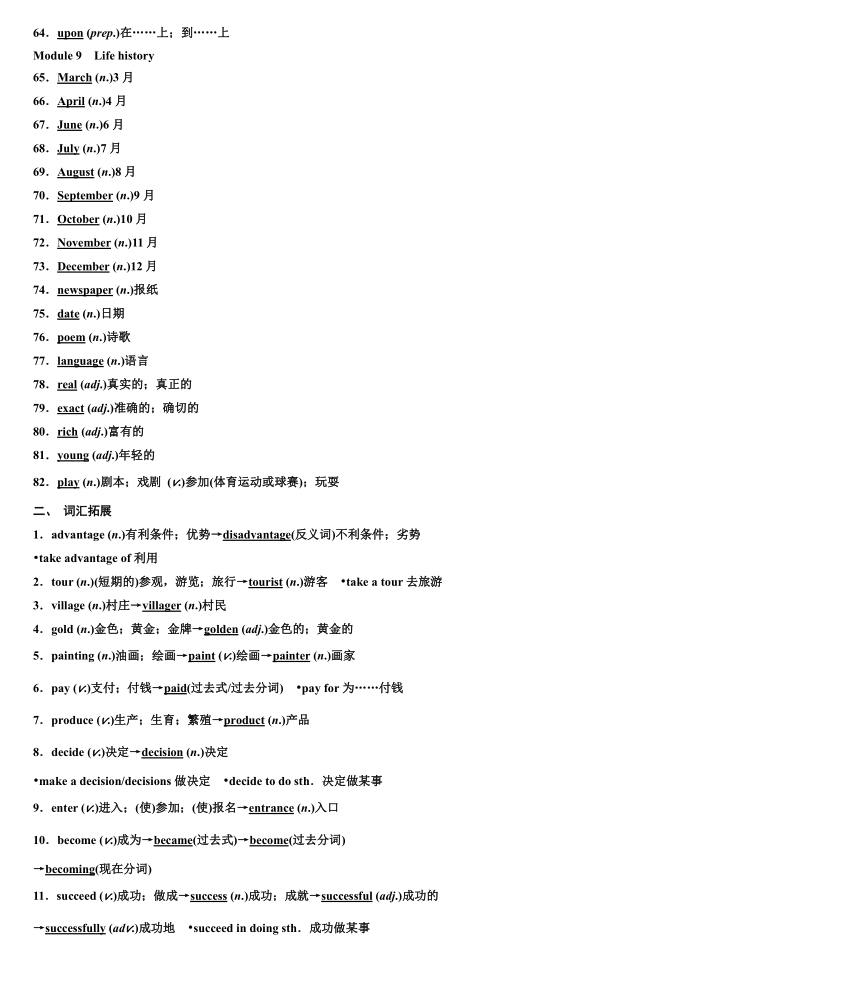2024年广东省英语外研版中考总复习七年级下册Modules 5~9 (含答案)
文档属性
| 名称 | 2024年广东省英语外研版中考总复习七年级下册Modules 5~9 (含答案) |  | |
| 格式 | docx | ||
| 文件大小 | 234.6KB | ||
| 资源类型 | 教案 | ||
| 版本资源 | 外研版 | ||
| 科目 | 英语 | ||
| 更新时间 | 2024-04-26 14:34:41 | ||
图片预览



文档简介
七年级下册 Modules 5~9
词汇与句式练习
一、 重点单词
Module 5 Shopping
1.market (n.)市场
2.biscuit (n.)饼干
3.lemon (n.)柠檬
4.strawberry (n.)草莓
5.size (n.)尺码;号
6.shopping (n.)购物
7.receive (v.)收到;接到
8.fresh (adj.)新鲜的
9.several (adj.)几个;一些
10.anywhere (adv.)在任何地方;往任何地方
11.almost (adv.)几乎;差不多
12.later (adv.)后来;以后
13.anything (pron.)任何东西;任何事情
14.anyone (pron.)任何人
15.post (n.& v.)邮寄
Module 6 Around town
16.museum (n.)博物馆
17.bridge (n.)桥
18.square (n.)广场
19.metre/meter (n.)米
20.railway (n.)铁路
21.church (n.)教堂
22.bank (n.)银行;岸边
23.cross (v.)穿过
24.famous (adj.)著名的
25.along (prep.)沿着
26.across (prep.)越过
27.opposite (prep.)在……的对面
28.above (prep.)在……上方;在……之上
29.middle (n.)中部;中间 (adj.)中等的;中部的
30.stop (n.)车站 (v.)停下,停止
31.underground (n.)地铁 (adj.)地下的 (adv.)在地下
Module 7 My past life
32.town (n.)城镇
33.bathroom (n.)浴室
34.bedroom (n.)卧室
35.garden (n.)花园
36.coast (n.)海岸
37.store (n.)商店
38.president (n.)总统
39.strict (adj.)严格的;严厉的
40.born (adj.)(动词bear的过去分词)出生
41.friendly/nice (adj.)友好的
42.primary (adj.)初等的;初级的
43.comfortable (adj.)舒适的;舒服的
44.last (adj.)(星期、 月份等)最近过去的,紧接现在前面的
45.ago (adv.)以前
46.yesterday (adv.)(在)昨天
Module 8 Story time
47.forest (n.)森林
48.piece (n.)部件;碎片;作品
49.part (n.)部分;地区
50.notice (v.)注意到
51.pick (v.)采;摘
52.push (v.)推
53.finish (v.)吃/喝完;用尽
54.return (v.)返回;归还
55.point (v.)指向;指
56.shout (v.)高声说;大声喊
57.hungry (adj.)感到饿的;饥饿的
58.asleep (adj.)睡着的
59.once (adv.)一次;一回
60.soon (adv.)立刻;不久
61.either (adv.)也(不)
62.around (prep.)环绕着;围绕
63.without (prep.)无;没有
64.upon (prep.)在……上;到……上
Module 9 Life history
65.March (n.)3月
66.April (n.)4月
67.June (n.)6月
68.July (n.)7月
69.August (n.)8月
70.September (n.)9月
71.October (n.)10月
72.November (n.)11月
73.December (n.)12月
74.newspaper (n.)报纸
75.date (n.)日期
76.poem (n.)诗歌
77.language (n.)语言
78.real (adj.)真实的;真正的
79.exact (adj.)准确的;确切的
80.rich (adj.)富有的
81.young (adj.)年轻的
82.play (n.)剧本;戏剧 (v.)参加(体育运动或球赛);玩耍
二、 词汇拓展
1.advantage (n.)有利条件;优势→disadvantage(反义词)不利条件;劣势
take advantage of利用
2.tour (n.)(短期的)参观,游览;旅行→tourist (n.)游客 take a tour去旅游
3.village (n.)村庄→villager (n.)村民
4.gold (n.)金色;黄金;金牌→golden (adj.)金色的;黄金的
5.painting (n.)油画;绘画→paint (v.)绘画→painter (n.)画家
6.pay (v.)支付;付钱→paid(过去式/过去分词) pay for为……付钱
7.produce (v.)生产;生育;繁殖→product (n.)产品
8.decide (v.)决定→decision (n.)决定
make a decision/decisions做决定 decide to do sth.决定做某事
9.enter (v.)进入;(使)参加;(使)报名→entrance (n.)入口
10.become (v.)成为→became(过去式)→become(过去分词)
→becoming(现在分词)
11.succeed (v.)成功;做成→success (n.)成功;成就→successful (adj.)成功的
→successfully (adv.)成功地 succeed in doing sth.成功做某事
12.die (v.)死;去世→died(过去式/过去分词)→dying(现在分词)
→dying (adj.)垂死的;即将死亡的→dead (adj.)死的;去世的
→death (n.)死;死亡 die down逐渐变弱;逐渐消失 die out灭绝
13.certain (adj.)确定的;无疑的→certainly (adv.)当然;行
be certain to do sth.一定做某事
14.safe (adj.)安全的→safety (n.)安全→safely (adv.)安全地
safety comes first安全第一
15.high (adj.)高的→height (n.)高度→highly (adv.)高地
speak highly of高度评价
16.dark (adj.)黑暗的→darkness (n.)黑暗
17.try (v.)尝试;试穿;品尝→tries(单三形式)→tried(过去式/过去分词)
try to do sth.努力做某事 try doing sth.尝试做某事
(n.)尝试;努力 have a try 试一试
18.east (adj.)东面的;东部的 (n.)东方→eastern (adj.)在东边的;来自东方的
三、 重点短语
1.试穿 try on
2.别急;稍等一会 wait a minute
3.散步 go for a walk
4.拿起;举起 pick up
5.指着…… point at
6.发现;查明;弄清 find out
7.邮政局 post office
8.小学 primary school
9.国际妇女节 International Women's Day
10.国庆节 National Day
11.儿童节 Children's Day
12.母亲节 Mother's Day
13.从前 once upon a time
14.破碎 in pieces
15.在……岁时 at the age of
16.在19世纪60年代 in the 1860s
17.劳驾,对不起 excuse me
18.世界各地 around the world
19.起初;首先 at first
四、 重点句式
1.为什么不问问那边的警察呢? Why not ask the policeman over there
2.伦敦以其服装店而闻名,店里卖男装、 女装和年轻人的服装。
London is famous for its clothes shops, for men and women and for young people.
3.这些故事让人兴奋,孩子们喜欢一遍又一遍地听它们。
The stories are exciting and children enjoy listening to them again and again右右右 .
4.她决定提着篮子去公园散步。
She decided to go for a walk in the park with her basket.
5.劳驾!你(们)能告诉我去王府井大街怎么走吗?
Excuse me! Can you tell me the way to Wangfujing Dajie
语法练习
特殊疑问句
( C )1.(2023陇南一模)— do you look worried, John
—I lost my new bike.
A.Who B.When
C.Why D.Where
( A )2.(2023厦门校考)— do you exercise every time during winter vacation
—About half an hour.
A.How long B.How often
C.How soon
方位介词
( B )3.(2023白银)The cat in Picture is on the box.
A. B. C. D.
( B )4.(2023抚顺)The girl takes her dog for a walk the river every morning.
A.in B.along
C.over D.under
一般过去时
( A )5.(2023赣州一模)They have just returned from their trip to Beijing.They many interesting places there.
A.visited B.were visiting
C.will visit D.are visiting
( C )6.(2023遂宁改编)—I saw your grandma using Douyin on the phone.Who taught her
—Nobody.She herself.
A.teaches B.is teaching
C.taught D.will teach
基础练习
一、 根据语境或提示,完成句子
1.I don't like crowded places, so I decide(决定) to stay at home rather than travel to somewhere during the holiday.
2.Lily was praised by her mother for she helped an old man walk across the street.
3.The air in the countryside is very fresh in the morning and I usually get up early to have a walk.
4.Linda's mother looks young and beautiful.It's hard to imagine she is already in her fifties.
5.The famous play, Romeo and Juliet, will be performed in this theatre tomorrow.
二、 用括号内所给单词的正确形式填空
1.Where were(be) you born
2.Cross(across) the bridge, and you can see the village you are looking for.
3.We need to buy some new furniture(furniture).
4.I met(meet) my maths teacher when I was walking in the street.
5.Long long ago, there was a girl called(call) Tian Tian.
三、 小语篇特训(教材链接:外研七下Module 9 Unit 2改编)
请从方框内选择适当的词并用其正确形式填空,使文章完整连贯。注意每空一词,每词仅用一次,有两词为多余项。
child friend play success write interesting when
William Shakespeare was a famous English writer of plays and poems.He 1.wrote about thirty-eight plays, 154 short poems and a few long poems in his life.Two of his famous 2.plays are Hamlet and Romeo and Juliet.
Shakespeare was born in 1564 in Stratford, England.At school he liked plays, so he decided to be an actor 3.when he finished school at fourteen.He married in 1582 and had three 4.children.Shakespeare went to London and joined a theatre company in about 1592.He became a 5.successful actor and began to write plays.Queen ElizabethⅠenjoyed his works very much.
强化练习
短文填空(2023汕头期末改编)
请从方框内选择适当的词并用其正确形式填空,使文章完整连贯。注意每空一词,每词仅用一次,有两词为多余项。
become it back ask so form of
because happy choice teach when
When it comes to Chinese operas, you might think of Peking Opera.But have you ever heard of Qinqiang Opera Qinqiang Opera is one of the earliest 1.forms of opera in China.According to historical records, the local opera dates 2.back to the Qin Dynasty (221-206 BC).
Hou Yan, 48, is the leader of Qinqiang Theatre of the Ningxia Performing Arts Group.She started learning Qinqiang Opera 3.when she was four.Training was very difficult for Hou at that time 4.because her teachers were very strict with students.She was often 5.asked to hold a simple move for half an hour and a small mistake could make her start all over again.
Luckily, her hard work paid off.Hou 6.became an excellent performer with a troupe(剧团) at the age of 16.However, in 1993, the popularity 7.of Western and pop music hit Qinqiang Opera hard.The troupe was closed and Hou had no 8.choice but to leave the opera she loved.
In the past years, China has decided to develop 9.its traditional culture.So Hou returned in 2000.“Although I had been away for several years, I never stopped practicing the opera.I felt 10.happier than ever before when I was back to perform again,” said Hou.“I hope more and more young people will take part in spreading our own culture.”
词汇与句式练习
一、 重点单词
Module 5 Shopping
1.market (n.)市场
2.biscuit (n.)饼干
3.lemon (n.)柠檬
4.strawberry (n.)草莓
5.size (n.)尺码;号
6.shopping (n.)购物
7.receive (v.)收到;接到
8.fresh (adj.)新鲜的
9.several (adj.)几个;一些
10.anywhere (adv.)在任何地方;往任何地方
11.almost (adv.)几乎;差不多
12.later (adv.)后来;以后
13.anything (pron.)任何东西;任何事情
14.anyone (pron.)任何人
15.post (n.& v.)邮寄
Module 6 Around town
16.museum (n.)博物馆
17.bridge (n.)桥
18.square (n.)广场
19.metre/meter (n.)米
20.railway (n.)铁路
21.church (n.)教堂
22.bank (n.)银行;岸边
23.cross (v.)穿过
24.famous (adj.)著名的
25.along (prep.)沿着
26.across (prep.)越过
27.opposite (prep.)在……的对面
28.above (prep.)在……上方;在……之上
29.middle (n.)中部;中间 (adj.)中等的;中部的
30.stop (n.)车站 (v.)停下,停止
31.underground (n.)地铁 (adj.)地下的 (adv.)在地下
Module 7 My past life
32.town (n.)城镇
33.bathroom (n.)浴室
34.bedroom (n.)卧室
35.garden (n.)花园
36.coast (n.)海岸
37.store (n.)商店
38.president (n.)总统
39.strict (adj.)严格的;严厉的
40.born (adj.)(动词bear的过去分词)出生
41.friendly/nice (adj.)友好的
42.primary (adj.)初等的;初级的
43.comfortable (adj.)舒适的;舒服的
44.last (adj.)(星期、 月份等)最近过去的,紧接现在前面的
45.ago (adv.)以前
46.yesterday (adv.)(在)昨天
Module 8 Story time
47.forest (n.)森林
48.piece (n.)部件;碎片;作品
49.part (n.)部分;地区
50.notice (v.)注意到
51.pick (v.)采;摘
52.push (v.)推
53.finish (v.)吃/喝完;用尽
54.return (v.)返回;归还
55.point (v.)指向;指
56.shout (v.)高声说;大声喊
57.hungry (adj.)感到饿的;饥饿的
58.asleep (adj.)睡着的
59.once (adv.)一次;一回
60.soon (adv.)立刻;不久
61.either (adv.)也(不)
62.around (prep.)环绕着;围绕
63.without (prep.)无;没有
64.upon (prep.)在……上;到……上
Module 9 Life history
65.March (n.)3月
66.April (n.)4月
67.June (n.)6月
68.July (n.)7月
69.August (n.)8月
70.September (n.)9月
71.October (n.)10月
72.November (n.)11月
73.December (n.)12月
74.newspaper (n.)报纸
75.date (n.)日期
76.poem (n.)诗歌
77.language (n.)语言
78.real (adj.)真实的;真正的
79.exact (adj.)准确的;确切的
80.rich (adj.)富有的
81.young (adj.)年轻的
82.play (n.)剧本;戏剧 (v.)参加(体育运动或球赛);玩耍
二、 词汇拓展
1.advantage (n.)有利条件;优势→disadvantage(反义词)不利条件;劣势
take advantage of利用
2.tour (n.)(短期的)参观,游览;旅行→tourist (n.)游客 take a tour去旅游
3.village (n.)村庄→villager (n.)村民
4.gold (n.)金色;黄金;金牌→golden (adj.)金色的;黄金的
5.painting (n.)油画;绘画→paint (v.)绘画→painter (n.)画家
6.pay (v.)支付;付钱→paid(过去式/过去分词) pay for为……付钱
7.produce (v.)生产;生育;繁殖→product (n.)产品
8.decide (v.)决定→decision (n.)决定
make a decision/decisions做决定 decide to do sth.决定做某事
9.enter (v.)进入;(使)参加;(使)报名→entrance (n.)入口
10.become (v.)成为→became(过去式)→become(过去分词)
→becoming(现在分词)
11.succeed (v.)成功;做成→success (n.)成功;成就→successful (adj.)成功的
→successfully (adv.)成功地 succeed in doing sth.成功做某事
12.die (v.)死;去世→died(过去式/过去分词)→dying(现在分词)
→dying (adj.)垂死的;即将死亡的→dead (adj.)死的;去世的
→death (n.)死;死亡 die down逐渐变弱;逐渐消失 die out灭绝
13.certain (adj.)确定的;无疑的→certainly (adv.)当然;行
be certain to do sth.一定做某事
14.safe (adj.)安全的→safety (n.)安全→safely (adv.)安全地
safety comes first安全第一
15.high (adj.)高的→height (n.)高度→highly (adv.)高地
speak highly of高度评价
16.dark (adj.)黑暗的→darkness (n.)黑暗
17.try (v.)尝试;试穿;品尝→tries(单三形式)→tried(过去式/过去分词)
try to do sth.努力做某事 try doing sth.尝试做某事
(n.)尝试;努力 have a try 试一试
18.east (adj.)东面的;东部的 (n.)东方→eastern (adj.)在东边的;来自东方的
三、 重点短语
1.试穿 try on
2.别急;稍等一会 wait a minute
3.散步 go for a walk
4.拿起;举起 pick up
5.指着…… point at
6.发现;查明;弄清 find out
7.邮政局 post office
8.小学 primary school
9.国际妇女节 International Women's Day
10.国庆节 National Day
11.儿童节 Children's Day
12.母亲节 Mother's Day
13.从前 once upon a time
14.破碎 in pieces
15.在……岁时 at the age of
16.在19世纪60年代 in the 1860s
17.劳驾,对不起 excuse me
18.世界各地 around the world
19.起初;首先 at first
四、 重点句式
1.为什么不问问那边的警察呢? Why not ask the policeman over there
2.伦敦以其服装店而闻名,店里卖男装、 女装和年轻人的服装。
London is famous for its clothes shops, for men and women and for young people.
3.这些故事让人兴奋,孩子们喜欢一遍又一遍地听它们。
The stories are exciting and children enjoy listening to them again and again右右右 .
4.她决定提着篮子去公园散步。
She decided to go for a walk in the park with her basket.
5.劳驾!你(们)能告诉我去王府井大街怎么走吗?
Excuse me! Can you tell me the way to Wangfujing Dajie
语法练习
特殊疑问句
( C )1.(2023陇南一模)— do you look worried, John
—I lost my new bike.
A.Who B.When
C.Why D.Where
( A )2.(2023厦门校考)— do you exercise every time during winter vacation
—About half an hour.
A.How long B.How often
C.How soon
方位介词
( B )3.(2023白银)The cat in Picture is on the box.
A. B. C. D.
( B )4.(2023抚顺)The girl takes her dog for a walk the river every morning.
A.in B.along
C.over D.under
一般过去时
( A )5.(2023赣州一模)They have just returned from their trip to Beijing.They many interesting places there.
A.visited B.were visiting
C.will visit D.are visiting
( C )6.(2023遂宁改编)—I saw your grandma using Douyin on the phone.Who taught her
—Nobody.She herself.
A.teaches B.is teaching
C.taught D.will teach
基础练习
一、 根据语境或提示,完成句子
1.I don't like crowded places, so I decide(决定) to stay at home rather than travel to somewhere during the holiday.
2.Lily was praised by her mother for she helped an old man walk across the street.
3.The air in the countryside is very fresh in the morning and I usually get up early to have a walk.
4.Linda's mother looks young and beautiful.It's hard to imagine she is already in her fifties.
5.The famous play, Romeo and Juliet, will be performed in this theatre tomorrow.
二、 用括号内所给单词的正确形式填空
1.Where were(be) you born
2.Cross(across) the bridge, and you can see the village you are looking for.
3.We need to buy some new furniture(furniture).
4.I met(meet) my maths teacher when I was walking in the street.
5.Long long ago, there was a girl called(call) Tian Tian.
三、 小语篇特训(教材链接:外研七下Module 9 Unit 2改编)
请从方框内选择适当的词并用其正确形式填空,使文章完整连贯。注意每空一词,每词仅用一次,有两词为多余项。
child friend play success write interesting when
William Shakespeare was a famous English writer of plays and poems.He 1.wrote about thirty-eight plays, 154 short poems and a few long poems in his life.Two of his famous 2.plays are Hamlet and Romeo and Juliet.
Shakespeare was born in 1564 in Stratford, England.At school he liked plays, so he decided to be an actor 3.when he finished school at fourteen.He married in 1582 and had three 4.children.Shakespeare went to London and joined a theatre company in about 1592.He became a 5.successful actor and began to write plays.Queen ElizabethⅠenjoyed his works very much.
强化练习
短文填空(2023汕头期末改编)
请从方框内选择适当的词并用其正确形式填空,使文章完整连贯。注意每空一词,每词仅用一次,有两词为多余项。
become it back ask so form of
because happy choice teach when
When it comes to Chinese operas, you might think of Peking Opera.But have you ever heard of Qinqiang Opera Qinqiang Opera is one of the earliest 1.forms of opera in China.According to historical records, the local opera dates 2.back to the Qin Dynasty (221-206 BC).
Hou Yan, 48, is the leader of Qinqiang Theatre of the Ningxia Performing Arts Group.She started learning Qinqiang Opera 3.when she was four.Training was very difficult for Hou at that time 4.because her teachers were very strict with students.She was often 5.asked to hold a simple move for half an hour and a small mistake could make her start all over again.
Luckily, her hard work paid off.Hou 6.became an excellent performer with a troupe(剧团) at the age of 16.However, in 1993, the popularity 7.of Western and pop music hit Qinqiang Opera hard.The troupe was closed and Hou had no 8.choice but to leave the opera she loved.
In the past years, China has decided to develop 9.its traditional culture.So Hou returned in 2000.“Although I had been away for several years, I never stopped practicing the opera.I felt 10.happier than ever before when I was back to perform again,” said Hou.“I hope more and more young people will take part in spreading our own culture.”
同课章节目录
